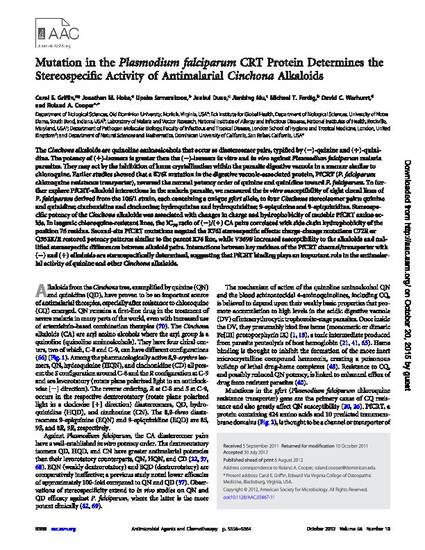
The Cinchona alkaloids are quinoline aminoalcohols that occur as diastereomer pairs, typified by (-)-quinine and (+)-quinidine. The potency of (+)-isomers is greater than the (-)-isomers in vitro and in vivo against Plasmodium falciparum malaria parasites. They may act by the inhibition of heme crystallization within the parasite digestive vacuole in a manner similar to chloroquine. Earlier studies showed that a K76I mutation in the digestive vacuole-associated protein, PfCRT (P. falciparum chloroquine resistance transporter), reversed the normal potency order of quinine and quinidine toward P. falciparum. To further explore PfCRT-alkaloid interactions in the malaria parasite, we measured the in vitro susceptibility of eight clonal lines of P. falciparum derived from the 106/1 strain, each containing a unique pfcrt allele, to four Cinchona stereoisomer pairs: quinine and quinidine; cinchonidine and cinchonine; hydroquinine and hydroquinidine; 9-epiquinine and 9-epiquinidine. Stereospecific potency of the Cinchona alkaloids was associated with changes in charge and hydrophobicity of mutable PfCRT amino acids. In isogenic chloroquine-resistant lines, the IC(50) ratio of (-)/(+) CA pairs correlated with side chain hydrophobicity of the position 76 residue. Second-site PfCRT mutations negated the K76I stereospecific effects: charge-change mutations C72R or Q352K/R restored potency patterns similar to the parent K76 line, while V369F increased susceptibility to the alkaloids and nullified stereospecific differences between alkaloid pairs. Interactions between key residues of the PfCRT channel/transporter with (-) and (+) alkaloids are stereospecifically determined, suggesting that PfCRT binding plays an important role in the antimalarial activity of quinine and other Cinchona alkaloids.
Copyright © 2004 American Society for Microbiology. All rights reserved.
Available at: http://works.bepress.com/roland_cooper/30/
